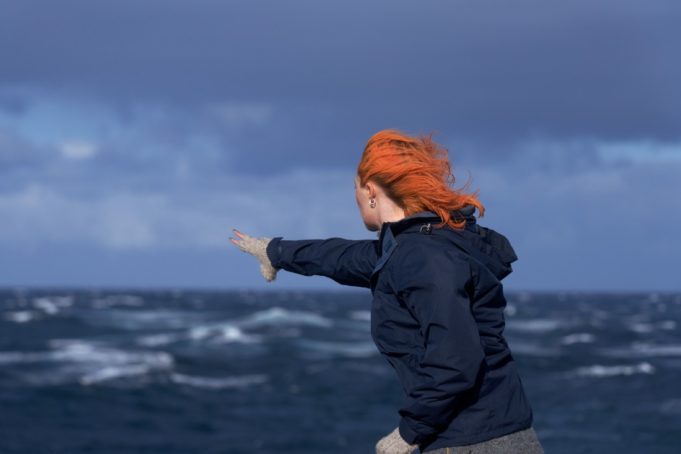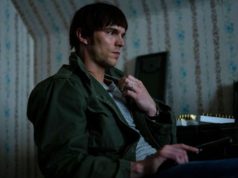The Outrun borrows a tactic from the 2018 meth drama Beautiful Boy in that it tells its story out of order deliberately to imitate the cyclical nature of addictions: The hooked person gets on to their drug of choice, hurts themselves and others, vows to stop, relapses, and the wheels on the bus go round and round. That’s how it feels to the addicts themselves and perhaps even more to the people who are along for that punishing ride. I sense that this movie uses the strategy better than Beautiful Boy does, but I’m not entirely sure that it adds up to the Edmund Burkean meditation on beauty and the sublime that it’s meant to be.
On the other hand, maybe you’re looking at this film and thinking, “I don’t care, I’ll sit down and watch Saoirse Ronan battle alcoholism for two hours no matter how grim it gets.” Funny, that same thought went through my mind while I was watching this.
The film is based on Amy Liptrot’s memoir of her own alcoholism — which I must admit I didn’t have a chance to read — and Ronan portrays Liptrot’s fictional alter ego Rona, a marine biology grad student who grew up as the daughter of English parents on the Orkney Islands north of Scotland. We first see Rona stumbling out of a London pub and accepting a ride home from a stranger who tries to rape her, and sporting an impressive black eye the next morning as she asks about rehab programs in the hospital. Taking on a scientific study for the Royal Society for the Protection of Birds, she exiles herself to the most remote of the Orkneys, where there’s no alcohol to be had and nothing to do except observe the wildlife and try to stay warm. The timeline skips around to her childhood dealing with a bipolar father (Stephen Dillane) and a mother (Saskia Reeves) who leaves him for Jesus, as well as a university career full of blackout periods and a boyfriend (Paapa Essiedu) who leaves her because of her drinking.
German writer-director Nora Fingscheidt (who did the Netflix thriller The Unforgivable) makes good use of the desolate, windswept beauty of the Orkneys as a backdrop. With her hair dyed all manner of colors, Rona frequently walks over the rocky cliffs while listening to electronic dance music through her earbuds, which weirdly matches the environment. Also on the soundtrack is Ronan’s reading of the voiceover narration in the character’s unplaceable English-Scottish brough, and while this actress draws a lot of attention for her mastery of various accents, she isn’t praised enough for the sonorous qualities of her voice itself. She delivers that narration in the detached tones of a scientist discussing the migratory habits of corncrakes, but then she lets the unease creep in as she shares her stories at AA, whether it’s with a large group in London or in a cramped attic with three older men on the island.
She also chain-smokes cigarettes and chain-drinks cans of Coke, and I’m a bit concerned that the film doesn’t point out how her addiction has jumped. The climactic sequence with Rona conducting ocean waves on the shore to the heaving swells of John Gürtler and Jan Miserre’s score leaves me mostly cold, too. It only works because Ronan moves so well with the seascape that you actually believe that she’s commanding the movements of the North Atlantic, and it lends credence to her narration comparing her body to a continent. The Outrun falls short of the best movies about addiction, but Saoirse Ronan turns it into a showcase for her own abilities to own the screen. You probably don’t need another reminder of how great she is, but this film gives one anyway.
The Outrun
Starring Saoirse Ronan. Directed by Nora Fingscheidt. Written by Nora Fingscheidt and Amy Liptrot, based on Liptrot’s memoir. Rated R.












